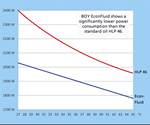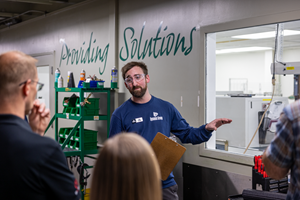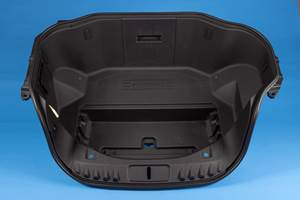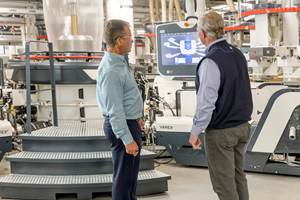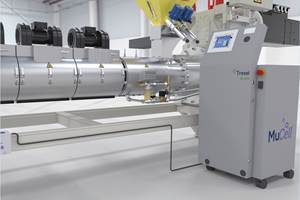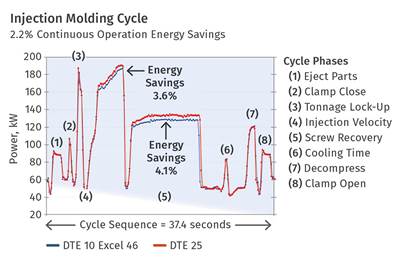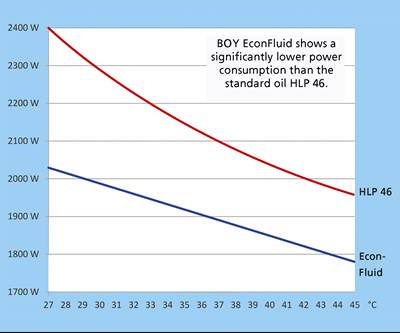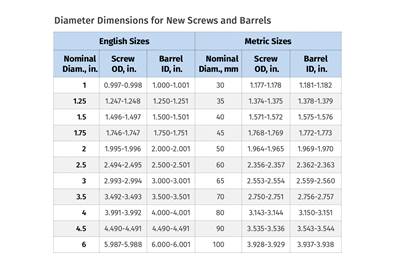Cut Operating Costs—and Headaches with the Right Hydraulic Oil
A big automotive molder found that switching hydraulic oils had a major impact on downtime, maintenance, and energy efficiency.
At a typical injection molding facility, the cost of hydraulic oil is less than 1% of operating costs, so it’s not something molders think about every day. But that oil can have a big impact on operating costs—maintenance labor, machine downtime, and even energy efficiency. One large automotive molder discovered this the hard way and learned valuable (literally) lessons on the importance of choosing the right hydraulic oil and properly maintaining oil quality and components of hydraulic systems—humble things like filters, valves and tank breathers.
Managing ‘Chaos’
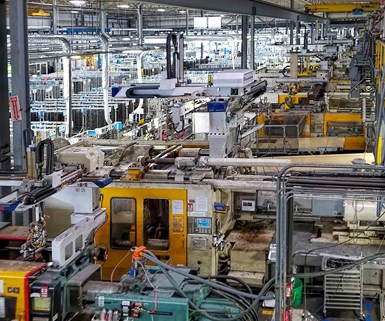
TG Missouri is gradually converting over 100 hydraulic presses to a high-performance hydraulic oil—Mobil DTE 10 Excel 46—that saves energy, better protects valves, and keeps the system cleaner.
TG Missouri is part of Toyoda Gosei, a global auto-parts manufacturer with revenues of $7.8 billion and more than 39,000 employees worldwide. In Perryville, Mo., TG Missouri (tgmissouri.com) occupies a campus of 11 buildings. One of them is Interior & Exterior Systems, which molds and assembles grilles (and chrome plates them), consoles, bumpers, instrument panels, etc. Scott Abernathy is maintenance senior manager in that building and oversees 106 hydraulic injection presses from 55 to 2200 tons (with a 2450-tonner on the way) and 50 all-electric machines. Some of those machines are as old as 25 years, but most are in the 10-15 year age range.
About five years back, “Scott was managing a lot of chaos—small incidents of things breaking or not working,” recalls Adam McMurtrey, a maintenance and reliability field engineer with Mobil Serv, the lubricants service of ExxonMobil (mobil.com). “It was like trying to keep 100 pots of boiling water covered with only 99 lids.”
“We are a JIT plant, so any downtime is huge.”
Abernathy elaborates: “For example, hydraulic valves often needed changing, pumps failed, and so did suction filters—which are one of the most common problem areas in molding shops. It was a long list of things. We experienced excessive noise, loss of pump pressure, functions like ejectors not working, and part-quality effects. We were putting a lot of labor into hydraulic issues, like having two or three people working on one large machines.”
As Abernathy explains, OEE (Overall Equipment Efficiency) is a key metric for TG. OEE encompasses machine uptime availability, speed, and quality performance. So tension was mounting: How to manage the chaos?
Things started looking up for Abernathy and TG Missouri with the arrival of Brandon Barton, territory sales manager for Morgan Distributing, a lubricants supplier in Jackson Mo. (mdilubes.com). Barton, himself a certified maintenance and reliability professional (CMRP), visited TG Missouri as a new customer. Barton brought in new ideas on maintenance and reliability. Scott was receptive: “We are a JIT plant, so any downtime is huge.”
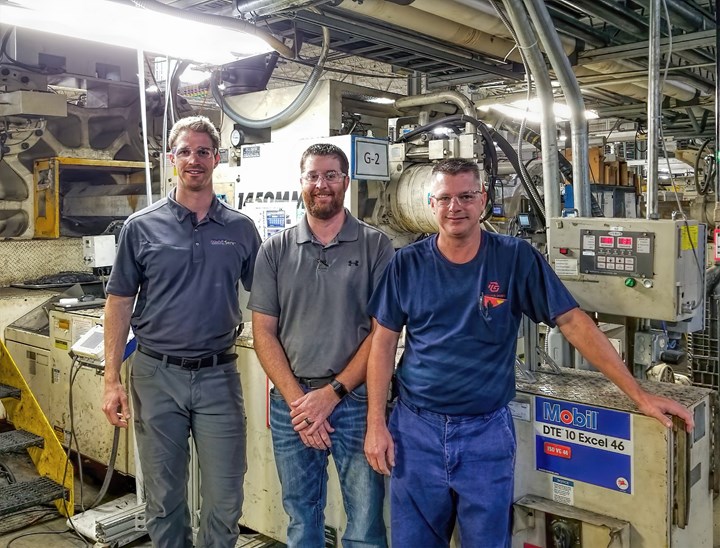
From left: Adam McMurtrey, Mobil Serv field engineer; Brandon Barton, territory sales manager for Morgan Distributing; Scott Abernathy, TG Missouri maintenance senior manager. Behind them is a 1450-ton press that went from 32 hr/yr of unscheduled downtime for hydraulic issues to zero problems in the year since switching to the new hydraulic oil.
“We needed data first, before we could decide how to proceed,” recalls Barton. “So we pulled oil samples; they told the story of what was happening inside the equipment. Oil is a window into the machine.” After a few months of data gathering and analysis—with the help of the Mobil Serv lubricant analysis service lab in Kansas City, Mo.—the problem was evident. “There was a lot of oxidation in the hydraulic oil, and it was not clean to industry (ISO) standards,” notes Barton. “Thirty percent of the machines were using oil that was at the end of its service life.” Some of that oil was eight to nine years old, whereas one year is the standard oil service life.
“We pulled oil samples; they told the story of what was happening inside the equipment. Oil is a window into the machine.”
Not only was it high time to replace the old oil, but Barton recommended that a higher performance oil could help prevent future problems. TG Missouri was already using a premium hydraulic oil, Mobil DTE 25. On Barton’s recommendation, the molder started switching its presses to Mobil DTE 10 Excel 46.
McMurtrey explains that this oil has a high viscosity index, meaning that it retains its viscosity across a wide temperature range. Further, it is less viscous at low (startup) temperatures than a standard oil, but has higher viscosity at higher running temperatures. That means greater lubricant protection of valves and other hardware. It also improves energy efficiency—more on this below.
Another benefit of Mobil DTE 10 Excel 46 is its proprietary formulation “helps keep itself clean,” McMurtrey says. “Simply explained, it grabs contaminants and conveys them to the filter and then drops them off at the filter.”
Quick Headache Relief
Abernathy’s plant began changing over some machines to the high-performance oil in July 2017. About 15% of the presses in the plant have been converted so far. Barton cites the example of a 1999-model, 1450-ton Mitsubishi machine that received the new oil in October 2018. “We have data on that machine back to 2015, when it had 3.5 hr of unscheduled downtime for hydraulic issues. In 2016 it racked up 31 hr of hydraulic valve issues. In 2017, that press had 32 hr unscheduled downtime for end-of-life hydraulic oil, suction-filter failures, and pump issues.”
The first step in the transition was to exchange the old oil with Mobil System Cleaner oil, which does just what the name says. Abernathy’s staff put in 5 gal a day for a week. Then they changed the oil over completely to Mobil DTE 10 Excel 46 and changed every filter, too. “We’ve had no hydraulic issues on that machine since then,” says Abernathy. “It runs so quiet, sounds like an all-electric machine. You can’t even hear it run.”
TG Missouri has not documented the energy efficiency of its machines before and after the oil change. However, Mobil Serv’s McMurtrey expects a minimum of 3% improvement. A 2017 study at EVCO Plastics in DeForest, Wis., sponsored by Wisconsin utilities’ Focus on Energy program, recorded 3.2% savings (see Jan. ’18 Close-Up). Other plants have found at least 6% savings, McMurtrey reports.
There are other long-term benefits from this experience, Abernathy points out. One is continued oil monitoring. The plant sends samples from the machines to the Mobil Serv lab and gets a report in about 12 days. “With that data, we can compare machines here with machines operating around the world. We can get a sense of what is the industry standard for oil life and cleanliness.”
“With data-based maintenance planning, we can compare the hydraulic performance of machines in different plants and different machines in the same plant.”
Another benefit is getting a handle on “criticality.” Explains Abernathy, “With hard data in hand, we can rally our resources to deal with the most pressing hydraulic issues. We can schedule and plan maintenance to make sure machines will be available now and five years from now. The data proves to management why we need to take this machine out of production now, and why it pays to buy a more expensive, high-performance hydraulic oil.”
Barton adds, “The team here is very receptive to the idea of data-driven maintenance. They began looking at all machines to see where they can make improvements.”
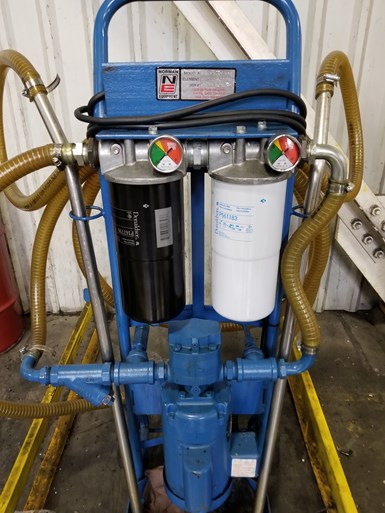
Data-based maintenance management prompted other changes, such as switching to more efficient hydraulic filters.
“That’s right,” says Abernathy. “With data gathering, we started seeing other problems that we added to the P.M. (preventive-maintenance) schedule. For example, we’ve started changing out tank breathers more often, after we saw the state they were in. We also changed the filters on the machines. The ones we had—3-micron beta 75—weren’t the best for the job. Brandon did some research and found much better ones—5-micron beta 1000—that aren’t any more expensive. So we switched to those.
Abernathy and another manager took their new learning on the road. They visited TG sister molding plants in Indiana and Mississippi, where they trained the maintenance departments in oil analysis and data-based maintenance planning. “Now we can compare the hydraulic performance of machines in different plants and different machines in the same plant,” notes Abernathy.
Related Content
Medical Molder, Moldmaker Embraces Continuous Improvement
True to the adjective in its name, Dynamic Group has been characterized by constant change, activity and progress over its nearly five decades as a medical molder and moldmaker.
Read MoreAutomotive Awards Highlight ‘Firsts,’ Emerging Technologies
Annual SPE event recognizes sustainability as a major theme.
Read MorePregis Performance Flexibles: In the ‘Wow’ Business
Pregis went big and bold with investment in a brand-new, state-of-the-art plant and spent big on expanding an existing facility. High-tech lines, well-known leadership and a commitment to sustainability are bringing the “wow” factor to blown film.
Read MoreFoam-Core Multilayer Blow Molding: How It’s Done
Learn here how to take advantage of new lightweighting and recycle utilization opportunities in consumer packaging, thanks to a collaboration of leaders in microcellular foaming and multilayer head design.
Read MoreRead Next
Switching Hydraulic Oil Saves Energy & Machine Downtime
Test at leading molder shows a high-viscosity, zinc-free oil improves pump efficiency and runs longer, cleaner, and quieter.
Read MoreInjection Molding: Optimized Hydraulic Oil Promises Energy Savings
New option for Boy injection machines saves up to 10% or more in energy consumption.
Read MoreTroubleshooting Screw and Barrel Wear in Extrusion
Extruder screws and barrels will wear over time. If you are seeing a reduction in specific rate and higher discharge temperatures, wear is the likely culprit.
Read More


